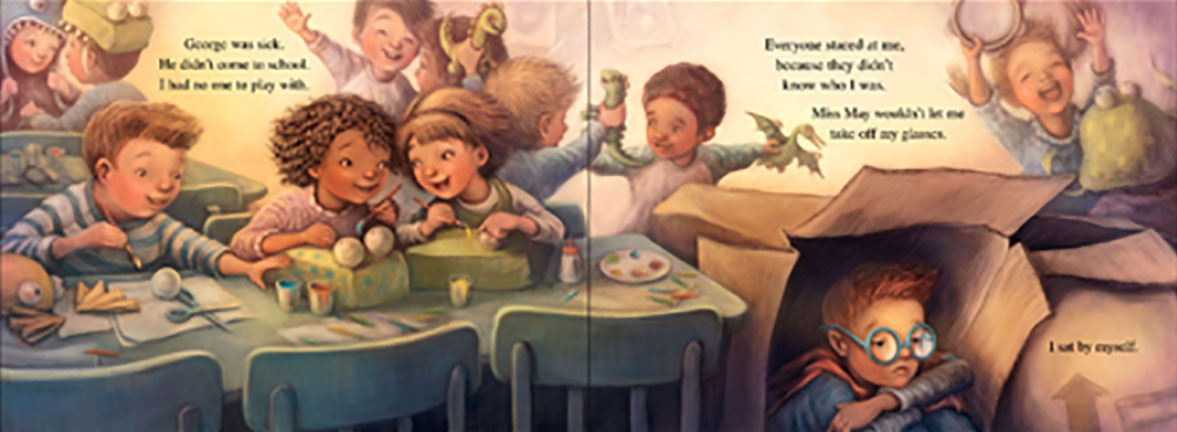
Sammy is fearless, leading his crew on daring adventures—until everything changes. His parents, his teacher, even his friends can’t seem to see him anymore. It was the day he became different.
Glasses give the gift of sight, but for kids, they can also bring a fear of standing out. While adults see glasses as something good, kids may see them as something that makes them different. And so, the great miscommunication begins. Sammy’s superhero confidence starts to fade, as he feels invisible in his own world.
The Boy in the Big Blue Glasses gives voice to children’s fears of being unaccepted, helping them discover that true superheroes aren’t defined by what they wear—but by their courage, confidence, and self-belief.
Illustrated by the award-winning, multi-talented Marjorie Crosby-Fairall, this is a funny, heartfelt, and empoweringpicture book that shows kids how to embrace change and celebrate their uniqueness.
Seeing the World in a Whole New Way – A Story of Confidence, Inclusion, and Superpowers!
The Boy in the Big Blue Glasses is a funny, heartfelt, and empowering picture book that explores the challenges of feeling different and the journey to self-acceptance. Sammy is a superhero, a fearless pirate, a leader of grand adventures—until the day he gets big blue glasses. Suddenly, he feels invisible to those around him, as if no one sees him the same way anymore.
This beautifully written and illustrated story captures the emotions, fears, and misunderstandings that can come with change, especially for children adjusting to something new. With a mix of humour, warmth, and adventure, the book helps young readers see the power in being themselves.
Through Sammy’s journey, The Boy in the Big Blue Glasses opens up conversations about self-esteem, communication, and inclusion, making it a perfect book for home, school, and storytime.
Why This Book Stands Out
With its playful yet powerful message, The Boy in the Big Blue Glasses reassures children that being different doesn’t mean being invisible—it means being seen in a whole new way!
Susanne Gervay is an award-winning Australian author, celebrated for her books that tackle real-life challenges with honesty, warmth, and humour. A passionate advocate for children’s literature and social issues, she works extensively in literacy programs, youth empowerment, and inclusion initiatives.
Her books resonate with young readers, addressing themes of resilience, self-acceptance, and standing up for what’s right. The Boy in the Big Blue Glasses is inspired by her own experience of wearing glasses as a child and the journey to embracing differences with confidence. With a deep understanding of how children navigate self-esteem and identity, Susanne continues to write books that empower, inspire, and uplift young people.
Her works, including the acclaimed I Am Jack series, Butterflies, and Elephants Have Wings, have earned international recognition, been adapted for stage, and are used in schools worldwide. She is dedicated to fostering positive conversations about diversity, inclusion, and self-worth, ensuring every child feels seen, valued, and celebrated.
Vision problems are secretive, incremental and make school very hard. Children usually can’t tell there is anything wrong as they assume everyone sees the world as they do. It effects their sport, reading, taking notes from the whiteboard, falling over, recognising people in the distance. It can lead to inaccurate labelling of children as slow learners, lacking confidence or even troublemakers when they actually have an undetected vision condition.
A boom in childhood myopia – or short sightedness – is a major contributing factor with more children than ever at risk of developing poor vision through a variety of factors including increased screen time and decreased ‘green time’ (time spent outdoors).
It is crucial for children to have a full eye examination with an optometrist before starting school and then regular visits as they progress through primary and secondary school, as part of their general health regime.

Children and teens with glasses face adjustment to wearing them. It can be hard to look after glasses and keep track of where they are. It can make children and teens feel different. They can be teased and identified as different. Kids may refuse to wear their glasses. It’s important that children feel included when they wear glasses and even a superhero.
For more information: Good Vision for Life
“A heartwarming and humorous story about self-acceptance and resilience. Sammy’s journey shows kids that being different doesn’t mean being invisible. Beautifully illustrated and a must-read for children adjusting to change.”
“A super book that reassures children struggling with glasses. Sammy’s story is relatable, funny, and uplifting, with stunning illustrations that bring his emotions to life.”
“A beautifully told story about overcoming self-doubt and embracing who you are. A valuable book for children and educators, filled with humour, warmth, and an important message.”